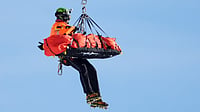Dozens of baby squid from Hawaii are in space for study.
The baby Hawaiian bobtail squid were raised at the University of Hawaii's Kewalo Marine Laboratory and were blasted into space earlier this month on a SpaceX resupply mission to the International Space Station.
Researcher Jamie Foster, who completed her doctorate at the University of Hawaii, is studying how spaceflight affects the squid in hopes of bolstering human health during long space missions, the Honolulu Star-Advertiser reported Monday.
The squid have a symbiotic relationship with natural bacteria that help regulate their bioluminescence.
When astronauts are in low gravity their body's relationship with microbes changes, said University of Hawaii professor Margaret McFall-Ngai, who Foster studied under in the 1990s.
Foster is now a Florida professor and principal investigator for a NASA program that researches how microgravity affects the interactions between animals and microbes.
“As astronauts spend more and more time in space, their immune systems become what's called dysregulated. It doesn't function as well," Foster said.
“Their immune systems don't recognize bacteria as easily. They sometimes get sick.”
Foster said understanding what happens to the squid in space could help solve health problems that astronauts face.
The baby squid will come back to Earth in July.





















